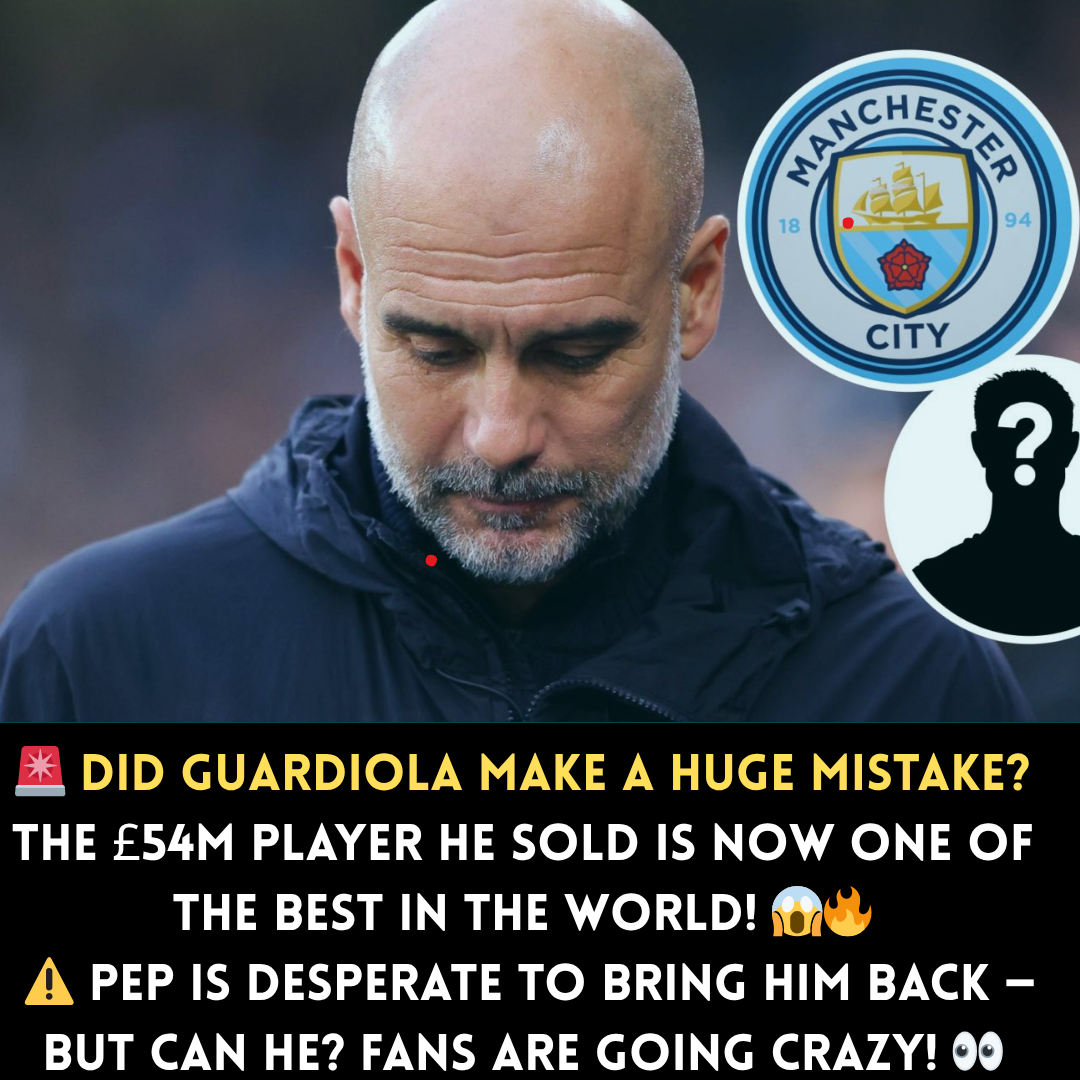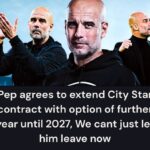Pep Guardiola could really regret selling £54m player, his future is uncertain at Manchester City

Manchester City find themselves at a crucial juncture in their recent history, emerging from what many consider their most disappointing campaign in years. The 2024-25 season witnessed the unprecedented sight of the Sky Blues finishing empty-handed, a stark contrast to their trophy-laden recent past. As Pep Guardiola and his coaching staff prepare for the upcoming season, the club’s transfer strategy has become a focal point of intense scrutiny and debate.
The Citizens’ struggles last season were multifaceted, stemming from a combination of defensive vulnerabilities, offensive inconsistencies, and perhaps most critically, the prolonged absence of their midfield metronome Rodri due to an ACL injury. The Spanish international’s absence exposed the team’s over-reliance on his unique skill set, highlighting the need for strategic reinforcements and tactical adaptability.
However, the narrative surrounding Manchester City’s rebuild extends beyond mere squad additions. It encompasses difficult decisions about existing players, particularly those who have struggled to justify their hefty price tags. Among these players, Matheus Nunes stands out as a particularly intriguing case study—a £54.5 million investment whose future at the Etihad Stadium remains uncertain despite showing promise in an unexpected position.
The Matheus Nunes Paradox: From Midfield Misfit to Makeshift Solution
When Manchester City acquired Matheus Nunes from Wolverhampton Wanderers for £54.5 million, the expectation was clear: the Portuguese international would bolster Guardiola’s midfield options with his technical ability, physicality, and versatility. However, the reality has proven far more complex than initially anticipated.
Guardiola’s candid assessment of Nunes in April 2025 revealed the tactical challenges the manager faces with the player. “He can become a good right-back for the physicality,” Guardiola stated, before delivering a more pointed critique: “I think he’s not a player to play in the middle because he’s not clever enough, in composure.” This frank evaluation encapsulated the central dilemma surrounding Nunes—a player caught between positions, struggling to fulfill his intended role while showing unexpected competence in another.
The transformation of Nunes from a central midfielder to a makeshift right-back represents one of the more fascinating tactical experiments in recent Premier League history. His physical attributes—pace, strength, and aerial ability—have translated surprisingly well to the defensive position. Standing at 6’0″ with a robust build, Nunes possesses the physical tools necessary to compete with Premier League wingers, while his technical background provides him with the ball-playing abilities Guardiola demands from his full-backs.
In his appearances at right-back, Nunes has demonstrated several key strengths that justify Guardiola’s continued faith in the position switch. His defensive solidity has been particularly impressive, with the Portuguese international showing an aptitude for one-on-one defending and aerial duels. His ground duel success rate and ability to track back effectively have provided Manchester City with a defensive stability that was often lacking in the previous campaign.
Moreover, Nunes’ attacking contributions from the right-back position have been noteworthy. His intelligent movement in the final third, combined with his dangerous crossing ability, has created numerous scoring opportunities for City’s forwards. The player’s midfield background has proven advantageous in this regard, as he possesses a better understanding of space and timing than many natural defenders.
The Right-Back Conundrum: A Position in Flux
Manchester City’s right-back situation has become increasingly complex as Kyle Walker’s career enters its twilight phase. The English international, while still capable of producing world-class performances, has shown signs of decline, particularly in his recovery pace and consistency over a full season. This natural progression has forced Guardiola to explore alternatives, leading to the club’s interest in several potential successors.
The pursuit of Tino Livramento from Newcastle United represents City’s preferred long-term solution. The 22-year-old has emerged as one of the Premier League’s most promising full-backs, combining pace, technical ability, and tactical intelligence in a package that aligns perfectly with Guardiola’s tactical requirements. Livramento’s ability to contribute in both phases of the game, his crossing accuracy, and his defensive positioning have made him a coveted target for several top clubs.
However, Newcastle United’s reluctance to part with Livramento has complicated City’s transfer plans. Eddie Howe’s determination to retain the young defender reflects both his importance to Newcastle’s project and the current market dynamics, where promising English players command premium prices and are increasingly difficult to pry away from ambitious clubs.
This potential roadblock has elevated the importance of alternative solutions, including the retention of Nunes in his adapted role. The Portuguese international’s continued development as a right-back could provide City with both short-term stability and long-term value, particularly given the significant investment already made in his services.
Tactical Analysis: Nunes in Guardiola’s System
Guardiola’s tactical system places unique demands on full-backs, requiring them to function as auxiliary playmakers while maintaining defensive discipline. The role demands technical proficiency, tactical intelligence, and the physical capacity to contribute across all phases of play. Nunes’ adaptation to this role has been remarkable, considering his limited experience in the position.
In possession, Nunes has shown an ability to drift inside and contribute to City’s build-up play, utilizing his midfield experience to find passing angles and maintain the team’s rhythm. His comfort on the ball and willingness to take risks in the final third have added a new dimension to City’s attacking play from the right flank.
Defensively, the Portuguese international has proven more solid than anticipated. His reading of the game, while still developing, has shown consistent improvement. His physical attributes allow him to compete effectively against Premier League wingers, while his pace enables him to recover from advanced positions when City lose possession.
The tactical flexibility that Nunes provides has not gone unnoticed by Guardiola. His ability to shift between midfield and defense within games has given City an additional layer of tactical complexity, allowing for in-game adjustments that can exploit opposition weaknesses or shore up defensive vulnerabilities.
The Rico Lewis Factor: Youth vs. Experience
Manchester City’s right-back considerations are further complicated by the presence of Rico Lewis, the academy graduate who has shown tremendous promise despite his young age. Lewis represents the epitome of Guardiola’s preference for technically gifted, intelligent players who can adapt to multiple positions.
However, Lewis’s physical limitations present a significant challenge for regular Premier League deployment. At 5’7″ and with a slight build, the young defender faces an uphill battle against the physical demands of Premier League football. While his technical ability and tactical intelligence are undeniable, questions remain about his capacity to handle the league’s most physical wingers over a full season.
Lewis’s own preference for playing in midfield adds another layer of complexity to City’s planning. The player’s comfort and effectiveness in central areas suggest that his long-term future may not lie at full-back, making the retention of Nunes even more critical for squad balance.
Market Dynamics and Financial Considerations
The current transfer market presents unique challenges for Manchester City’s recruitment strategy. The club’s previous investments, particularly the £54.5 million spent on Nunes, create both opportunities and constraints in their approach to squad building.
From a financial perspective, allowing Nunes to leave would represent a significant loss on investment, particularly given his limited impact in his intended position. The depreciation in his market value, combined with the current economic climate in football, makes his retention a more attractive proposition from a purely financial standpoint.
Furthermore, the inflated market for quality full-backs makes Nunes’ adaptation to the position even more valuable. The cost of acquiring a proven Premier League-quality right-back could easily exceed £40-50 million, making the Portuguese international’s development in the role a cost-effective solution.
Alternative Targets: The Kiliann Sildillia Option
Manchester City’s interest in Kiliann Sildillia from SC Freiburg represents another potential solution to their right-back needs. The French defender, currently featuring in the U-21 European Championship, has caught the attention of several top clubs with his consistent performances in the Bundesliga.
Sildillia’s contract situation, with his deal expiring in 2026, presents both opportunities and challenges for City. While the limited remaining term could reduce his transfer fee, it also increases competition from other interested clubs who may view him as a bargain acquisition.
The 22-year-old’s profile aligns well with Guardiola’s tactical requirements. His pace, crossing ability, and defensive positioning have drawn favorable comparisons to some of Europe’s top full-backs. However, his lack of Premier League experience and the adaptation period required for Guardiola’s system must be considered in any evaluation.
The Broader Squad Context
Manchester City’s right-back situation cannot be viewed in isolation from their broader squad development. The return of Rodri from injury has provided stability to the team’s midfield, while the additions of Rayan Ait-Nouri, Tijjani Reijnders, and Rayan Cherki have addressed several key areas of concern.
These signings have created a more balanced squad, potentially reducing the pressure on individual positions while providing Guardiola with greater tactical flexibility. The improved squad depth could allow for more patient development of players like Nunes, reducing the urgency to make hasty decisions about his future.
Long-term Strategic Implications
The decision regarding Nunes’ future has implications beyond the immediate 2025-26 season. Retaining the Portuguese international could provide City with a valuable squad player who can cover multiple positions, while his continued development at right-back could yield significant returns on their investment.
Conversely, allowing Nunes to leave could free up wages and squad space for alternative targets, potentially accelerating the club’s rebuild in other areas. The decision requires careful consideration of both short-term tactical needs and long-term strategic objectives.
Conclusion: A Decision Point for City’s Future
As Manchester City navigate their post-disappointment rebuild, the Matheus Nunes situation encapsulates the broader challenges facing modern football clubs. The Portuguese international’s journey from midfield misfit to potential right-back solution highlights both the unpredictability of player development and the importance of tactical flexibility in modern football.
Guardiola’s decision regarding Nunes will likely be influenced by several factors: the success of alternative transfer targets, the continued development of Rico Lewis, and the overall balance of the squad. However, the evidence suggests that retaining Nunes, at least for the immediate future, represents the most pragmatic approach.
The player’s adaptation to the right-back role, while not perfect, has provided City with a viable option in a position of need. His physical attributes, improving tactical understanding, and existing chemistry with the squad make him a valuable asset, regardless of his future role in the team.
As the transfer window progresses and City’s plans become clearer, the Nunes situation will remain a fascinating subplot in their broader rebuild. Whether he emerges as a long-term solution at right-back or eventually finds his way back to midfield, his journey at Manchester City serves as a reminder of the complex decisions that shape modern football’s transfer landscape.
The coming season will likely provide definitive answers about Nunes’ future role, but for now, Pep Guardiola’s pragmatic approach to squad management suggests that the Portuguese international will remain an important part of Manchester City’s plans, even if not in the way originally envisioned when he first arrived at the Etihad Stadium.















